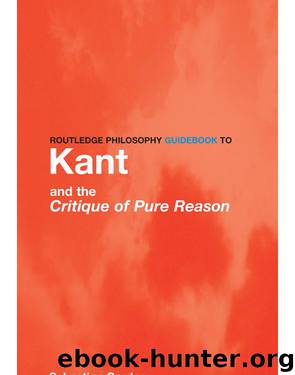Routledge Philosophy GuideBook to Kant and the Critique of Pure Reason by Gardner Sebastian

Author:Gardner, Sebastian.
Language: eng
Format: epub
Publisher: Taylor & Francis (CAM)
Transcendental Arguments, Transcendental Idealism and Kant’s Reply to the Skeptic
It is worth now considering in a little more detail a set of closely related and controversial general issues surrounding the Analytic: the concept of a transcendental argument, mentioned briefly in chapter 2, and its relation to transcendental idealism; whether the Analytic can be held to advance the case for transcendental idealism; and how Kant deals with skepticism.
Transcendental Arguments
The term transcendental argument, in modem philosophical vocabulary, refers not specifically to those arguments actually given by Kant, but to a type of argumentation putatively inaugurated in the Critique. A transcendental argument is distinguished by the status and use made of its chief premise. This consists in a claim, typically expressed in the first person, which is logically contingent, uninferred, and advanced without further grounding, but the denial of which would yield some absurdity. Examples are: I have experience; my experience is temporal; I am self-conscious; I think; I make judgements. Conceptual connections are then teased out to show that the premise can be true only if a certain other proposition, of a controversial and more philosophically interesting character, such as the principle of causality, is also true. Transcendental arguments thus generate conclusions which are strictly conditional – e.g. if I am to have experience, then causality must obtain – but where the consequent inherits (if the argument is successful) the incontrovertibility of the argument’s premise. The target proposition is thereby rendered immune to skepticism, since in order to challenge it the skeptic would need to doubt something that cannot be doubted intelligibly, e.g. that he has experience. Transcendental arguments, it may then be claimed, show something about reality: the knowledge that we can have experience only if its objects have causal form, together with the given fact of experience, allows us to know that reality is indeed causal.
Reasons have already been given for denying that transcendental arguments so conceived, despite their obvious proximity to the method of the Analytic, especially the Refutation of Idealism, should be attributed to Kant. Quite apart from the fact that it fractures the Critique by dissociating Kant’s epistemology from his metaphysics, transcendental arguments repose on purely conceptual connections: their conclusions are analytic rather than synthetic a priori, so that, in Kant’s terms, they identify mere ‘subjective conditions of thought’ rather than demonstrating objective validity. As a consequence, transcendental arguments are not effective against skepticism, at least not on terms acceptable to Kant. The essence of this point was explained in the earlier discussion of what happens to the Refutation of Idealism if transcendental idealism is stripped from it. Faced with a transcendental argument purporting to show the necessity of the principle of causality, for example, the skeptic is free to raise the question why we should suppose that the argument shows anything at all about how things are, rather than just something about how we must think, i.e. a merely psychological necessity. Transcendental arguments can be defended here by appealing to verificationism (‘the notion of a reality
Download
This site does not store any files on its server. We only index and link to content provided by other sites. Please contact the content providers to delete copyright contents if any and email us, we'll remove relevant links or contents immediately.
The remains of the day by Kazuo Ishiguro(7542)
Tools of Titans by Timothy Ferriss(6936)
The Black Swan by Nassim Nicholas Taleb(6184)
Inner Engineering: A Yogi's Guide to Joy by Sadhguru(5887)
Giovanni's Room by James Baldwin(5872)
The Way of Zen by Alan W. Watts(5790)
The Six Wives Of Henry VIII (WOMEN IN HISTORY) by Fraser Antonia(4784)
The Power of Now: A Guide to Spiritual Enlightenment by Eckhart Tolle(4749)
Astrophysics for People in a Hurry by Neil DeGrasse Tyson(4614)
Asking the Right Questions: A Guide to Critical Thinking by M. Neil Browne & Stuart M. Keeley(4566)
12 Rules for Life by Jordan B. Peterson(3724)
The Ethical Slut by Janet W. Hardy(3494)
Skin in the Game by Nassim Nicholas Taleb(3456)
Housekeeping by Marilynne Robinson(3396)
The Art of Happiness by The Dalai Lama(3378)
Double Down (Diary of a Wimpy Kid Book 11) by Jeff Kinney(3267)
Skin in the Game: Hidden Asymmetries in Daily Life by Nassim Nicholas Taleb(3259)
Walking by Henry David Thoreau(3227)
12 Rules for Life: An Antidote to Chaos by Jordan B. Peterson(3196)
